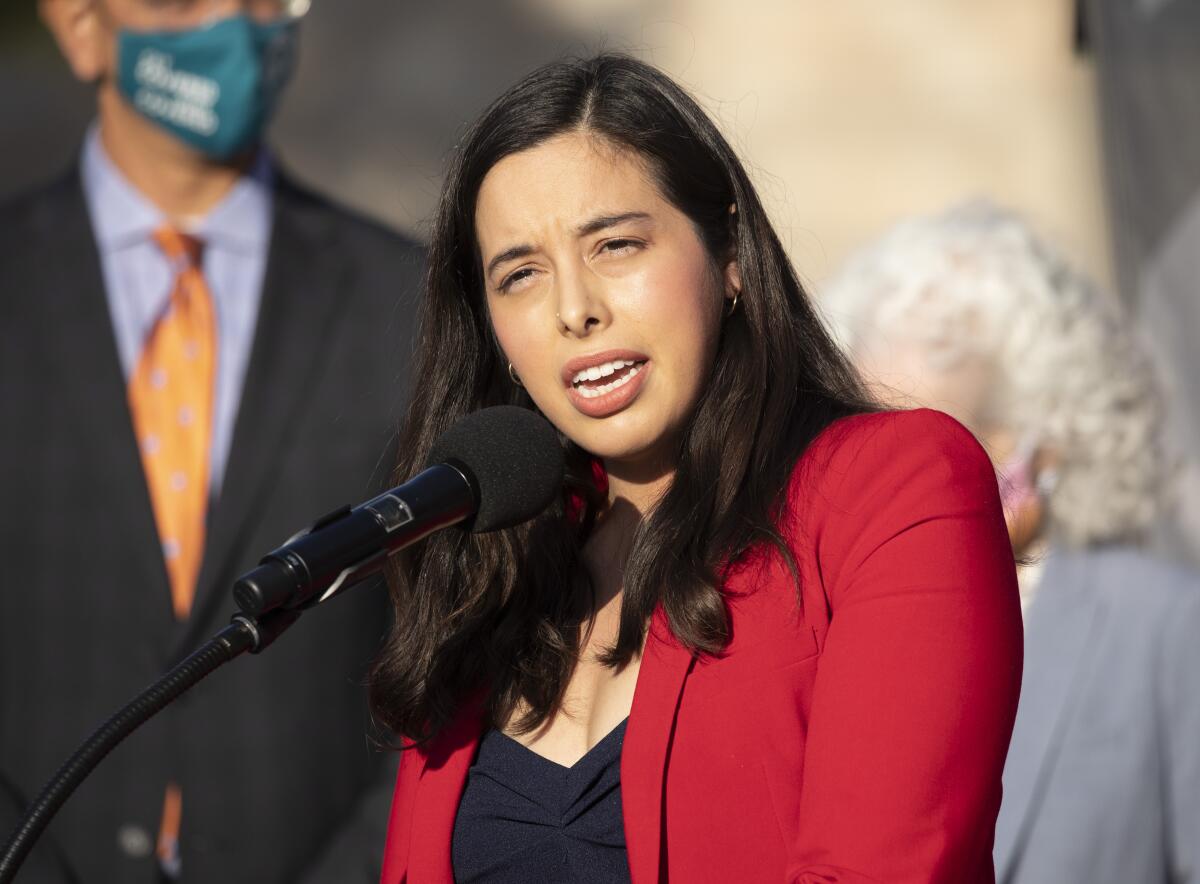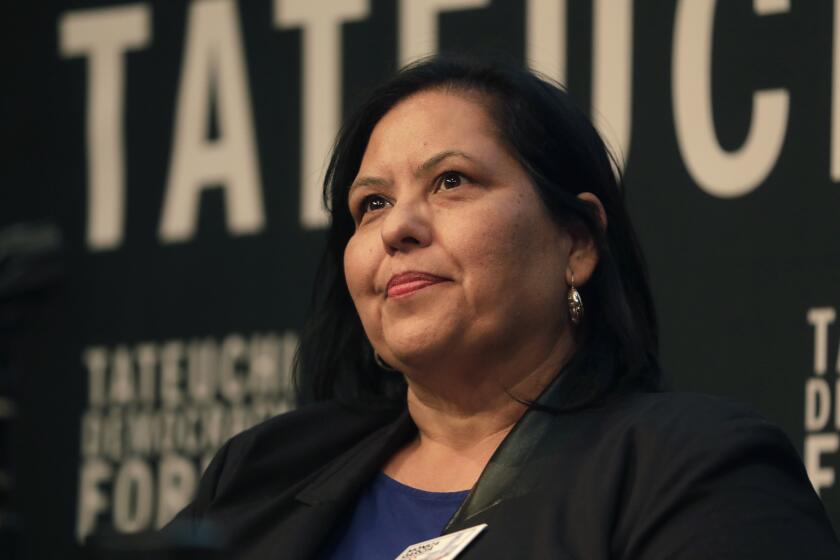Editorial: Brenes, Melvoin and Gonez for L.A. Unified school board

- Share via
The Los Angeles Unified School District faces a historic set of challenges right now — and has a rare opportunity to reshape itself into a far more sane and successful operation.
The COVID-19 pandemic has taken a tremendous toll on students, staff and families, emotionally, academically and physically. Enrollment is declining at higher-than-predicted rates. Keeping under-attended campuses open will require imagination. Teachers are in short supply and counselors are even tougher to recruit. Reading and math skills are far below where they need to be.
Yet the district also has improved in the last decade. Graduation rates have risen and so have the number of students qualifying to attend California’s public four-year colleges. Funding is spread more equitably, and right now, there is a lot of it; the key is to spend it wisely, because federal rescue money will last for only a couple more years. After former Supt. Austin Beutner did a largely admirable job of steering the district through the tremendous organizational challenges of the pandemic, L.A. Unified has a new superintendent, Alberto M. Carvalho, with a strong and stable history in education.
Large urban districts, including L.A. Unified, accounted for about one-third of the decline.
And now change comes to the school board, whose members serve four-year terms. Three of the seven seats are in contention this year, though only one is guaranteed to be occupied by a newcomer. That’s in District 2, where Monica Garcia, who was first elected to the board in 2006, is termed out.
For her replacement, the school board needs a member who is more about ideas than ideology. That’s especially true considering that the warring forces of pre-pandemic days — reformers backed by wealthy charter-school advocates, and allies of the teachers union, United Teachers Los Angeles — appear ready to reemerge.
Four are vying to replace Garcia, who faces term limits after more than 15 years. Challengers face an uphill battle in two other races.
District 2: Maria Brenes
Voters in District 2 — which encompasses downtown L.A., Los Feliz, Highland Park, Boyle Heights, El Sereno and East L.A. — have two good choices: Maria Brenes, the executive director of East L.A. advocacy group InnerCity Struggle; and Rocio Rivas, policy deputy to school board member Jackie Goldberg. Both are smart, well-informed and dedicated candidates who place a premium on the key issue for L.A. Unified — educational equity for students of color and those from impoverished families. Brenes hails more from the reform side of the equation — which would continue the existing reform majority on the board — while Rivas is UTLA’s pick. Both are parents of students in the district. Both appear thoughtful, nuanced and caring.
Voters can’t go wrong by picking either candidate. But Brenes has a slight advantage over Rivas. She has actively worked for years to bring a sense of urgency to improving educational outcomes in under-resourced schools that had low expectations of their Black and Latino students.
She was one of the major forces behind the district’s equity funding index to send more money to schools with the most educational challenges. In a move that seemed less well thought out, she also pushed successfully for the district to require all students to take the full roster of college prep courses and get at least a C in all of them in order to graduate. It was an example of setting an unrealistic goal instead of making wise policy to improve education, and of course it imploded.
Brenes has dropped that line of thinking and says she would look to improve education by building up to higher achievement rather than dropping a graduation-requirement bomb that might encourage more grade inflation or unfairly deprive a student of a high school diploma. She talks of addressing students’ needs holistically — including tutoring targeted to students’ individual needs and using the district’s major landholdings to help provide affordable housing to help stem the movement of families out of the district.
Rivas’ work for board member Goldberg centered on charter schools, early education and dual language and arts education. As the UTLA-endorsed candidate, it’s not surprising that she raises concerns about charter schools “getting away with things,” but her concerns have some merit when it comes to charter schools moving from one neighborhood to another without going through the proper channels. She would be a solid board member but voices fewer creative ideas than Brenes.
The two other candidates in the race aren’t ready for the position. Erica Vilardi-Espinosa is an involved parent in the Los Feliz schools. She takes a balanced if parochial approach to issues, expresses justifiable frustration with the district’s slow response to individual school needs and talks about creating more engaging lessons for students. But she puts too little emphasis on the equity issues facing the district and the deep needs of its most disadvantaged students. She could build a stronger candidacy in the future by getting more familiar with the district and developing a broader outlook.
Miguel Angel Segura is a substitute teacher in the school district who has good ideas about forming partnerships with businesses and artists in the community to bolster school programs. But he has little to offer regarding the yawning gaps in improving educational outcomes.
Here are the L.A. Times’ editorial board endorsements for elected offices in Los Angeles city and county, LAUSD, superior court, statewide offices, the state legislature and U.S. House and Senate seats.
District 4: Nick Melvoin
Voters in District 4 — which includes Hancock Park, Brentwood, Pacific Palisades, Encino, Tarzana and Woodland Hills — don’t have inspiring options. But in the absence of a stronger challenger, incumbent Melvoin should continue in the job.
He pushed for the district’s one-stop shop for school enrollment — where parents pick from community schools, magnets and other schools — to include charter schools. Though many opponents of charter organizations opposed inclusion, it made sense to present parents with all their public school options. But Melvoin can be narrow in his thinking. One example: He pressed for and was the lone vote in favor of a ridiculously simplistic 1-to-5 rating system for schools based mostly on their test scores. It would have been unfair to many schools and not useful for parents.
He voices a more nuanced approach these days — perhaps the pandemic helped make clear to him that a more holistic approach is needed to improve educational outcomes for students. We hope that if he is reelected, his proposals and actions will reflect greater maturity in his outlook.
He could have been vulnerable to a challenge, but his two opponents offer no real options for voters. Tracey Schroeder, who lists herself as a teacher, does not appear to have mounted a serious campaign and did not respond to repeated requests for an interview with The Times editorial board.
Gentille Barkhordarian is a parent who wants to give the decision on vaccination and masking in schools to parents. Though the rules on both these have eased for now, no one who is unwilling to take strong protective measures for staff and students should be on the board. Barkhordarian also has trouble articulating evidence for her positions aside from anecdotal complaints from parents within her social network.
District 6: Kelly Gonez
Incumbent Kelly Gonez was seen as a reform/charter candidate when she first won office in 2017. But Gonez, a former charter school teacher, is more likely to take balanced positions based on the individual issues, not on a particular ideological bent in placing the needs of underserved students first.
Among other things, she had a hand in tripling the number of dual-language programs in the East Valley, which she represents. The area had relatively few such programs compared with the rest of the school district. She also helped create an enriched studies program in her district that includes more parental involvement and advanced courses, and a shift in hiring practices to give high-needs schools top priority. She makes sense when she says the district should be able to scale back its universal weekly coronavirus testing and use some of the hundreds of millions of dollars it costs per year on student learning needs.
Her tenure has been so balanced that UTLA, which favored her opponent in 2017, is endorsing Gonez this time around.
Her opponents — Jess Arana, a wrestling coach and sergeant with L.A. Unified’s Police Department, who opposed the district’s vaccine and mask mandates and felt it should be parents’ choice; and Marvin A. Rodriguez, a Spanish teacher at Cleveland High School who advocates for more parental decision-making within schools — lack Gonez’s grasp of the big issues and ambitious policy agenda.
Read more endorsements at: latimes.com/endorsements.
More to Read
A cure for the common opinion
Get thought-provoking perspectives with our weekly newsletter.
You may occasionally receive promotional content from the Los Angeles Times.













